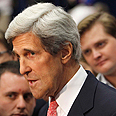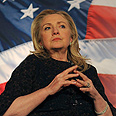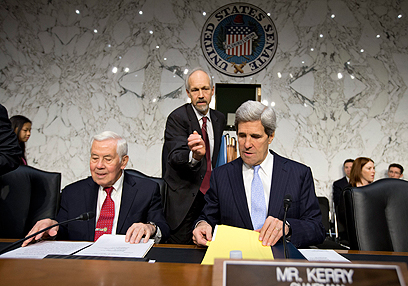

President Barack Obama on Friday nominated Sen. John Kerry as his next secretary of state, elevating the longtime lawmaker and foreign policy expert to the top diplomatic job he had coveted.
"He is not going not need a lot of on-the-job training," Obama said, standing alongside Kerry at the White House. "Few individuals know as many presidents and prime ministers or grasp our policies as firmly as John Kerry."
Related stories:
- Is John Kerry good for Israel?
Obama named Time's 'Person of the Year'
US: Hagel nomination irks pro-Israel conservatives
If confirmed by the Senate, Kerry would replace Secretary of State Hillary Rodham Clinton, who plans to leave Obama's second-term Cabinet early next year. Clinton, who is recovering from a concussion sustained in a fall, did not attend the Roosevelt Room announcement.
The 69-year-old Democrat is expected to be easily confirmed by his Senate colleagues. He would be the first of what are expected to be several new faces on Obama's national security team, including a new defense secretary and director of the Central Intelligence Agency.

Kerry (R), chairman of Senate Foreign Relations Committee (Photo: AP)
The son of a diplomat, Kerry has served as chairman of the Senate Foreign Relations Committee and is a decorated Vietnam veteran who was critical of the war effort when he returned home to the United States. He has represented Massachusetts in the Senate since 1985.
"John's entire life has prepared him for this role" said Obama, who praised Kerry for his belief that the country must harness "all elements of Americans power."
The president picked Kerry for the post even though his nomination could create a political problem in Massachusetts. Republicans are eying the Senate seat Kerry will vacate after five terms, and recently defeated GOP Sen. Scott Brown would be a favorite in his party for the job.
Kerry's nomination could bring to a close what has become for the White House a contentious and distracting effort to find a new secretary of state.
His only other rival for the job, UN Ambassador Susan Rice, faced harsh criticism from congressional Republicans for her initial accounting of the deadly September attack on Americans in Benghazi, Libya. Obama vigorously defended Rice, a close friend and longtime adviser, but Republican senators dug in, threatening to hold up her nomination if the president tapped her for the post.
Rice withdrew her name from consideration last week, making Kerry all but certain to become the nominee. People familiar with the White House's decision-making said support within the administration was moving toward Kerry even before Rice pulled out.
Defense nomination pending
The Cabinet nomination of Kerry is the first Obama has made since winning a second term, and the first piece in an extensive shuffle of his national security team. The president is also expected to nominate a new defense secretary soon to take over for retiring Leon Panetta and a new director of the Central Intelligence Agency to replace former spy chief David Petraeus, who resigned last month after admitting to an affair with his biographer.

Kerry with George W. Bush in 2004 (Photo: AP)
Former Republican Sen. Chuck Hagel is a front-runner for the Pentagon post, but has been dogged by questions about his support for Israel and where he stands on gay rights, with critics calling on him to repudiate a comment in 1998 that a former ambassadorial nominee was "openly, aggressively gay."
As the nation's top diplomat, Kerry will be tasked with not only executing the president's foreign policy objectives, but also shaping Obama's approach. The senator offered some insight into his world view on Thursday during a Senate Foreign Relations committee hearing he chaired on the deadly September attack on a US consulate in Benghazi, Libya.
Kerry called on Congress to put enough money into America's foreign policy objectives and said doing so is an investment "in our long-term security and more often than not it saves far more expensive expenditures in dollars and lives for the conflicts that we failed to see or avoid."
And he emphasized the importance of US diplomats being able to work freely in places like Benghazi, despite its dangers.
"There will always be a tension between the diplomatic imperative to get `outside the wire' and the security standards that require our diplomats to work behind high walls," he said. "Our challenge is to strike a balance between the necessity of the mission, available resources and tolerance for risk."
Kerry has long sought the nation's top diplomatic post. Obama considered him for the job after the 2008 election before picking Clinton, his defeated rival for the Democratic presidential nomination, in a surprise move.
Since then, Obama has dispatched Kerry around the world on his behalf numerous times, particularly to tamp down diplomatic disputes in Afghanistan and Pakistan. He was also part of Obama's debate preparations team during the 2012 election, playing Republican challenger Mitt Romney in mock debates.
Kerry also won praise from Obama aides for his sharp national security-focused speech at the Democratic National Convention in August. He told delegates: "Ask Osama bin Laden if he's better off now than he was four years ago."
Before nominating Kerry, the White House consulted with congressional Democrats about the fate of the Senate seat he has held for five terms. Democrats have sought to assure the White House that the party has strong potential candidates in the state.
Kerry has pushed the White House's national security agenda in the Senate with mixed results. He ensured ratification of a nuclear arms reduction treaty in 2010 and most recently failed to persuade Republicans to back a UN pact on the rights of the disabled.
The senator was also outspoken in pushing for a 2011 no-fly zone over Libya as Muammar Gaddafi's forces attacked rebels and citizens.
- Receive Ynetnews updates
directly to your desktop















